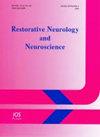额外窦造口引流额叶脓肿
IF 1.6
4区 医学
Q4 NEUROSCIENCES
引用次数: 0
摘要
本文报告一例额窦炎合并后壁骨髓炎导致额叶脑脓肿的病例,耳鼻喉外科医生通过外窦造口术暴露后壁裂口,然后由神经外科医生通过裂口引流脓肿。这是一种不需要额骨开颅的额叶脑脓肿引流术。该入路对脑组织的损伤最小,因为额窦脓肿非常靠近额窦后壁,引流需要经过最小的脑内距离。本文章由计算机程序翻译,如有差异,请以英文原文为准。
External Frontal Sinostomy to Drain Frontal Lobe Abscess
A case of frontal sinusitis with osteomyelitis of its posterior wall producing frontal lobe brain abscess is presented, whereby the posterior wall dehiscence was exposed by external sinostomy by an ENT surgeon and then, through the dehiscence, the abscess was drained by a neurosurgeon. This is an uncommon technique of draining a frontal lobe brain abscess where no frontal bone craniotomy was required. This approach yields the least damage to the cerebral tissue as the frontal abscess was very close to posterior wall of frontal sinus and drain has to travel through minimal intracerebral distance.
求助全文
通过发布文献求助,成功后即可免费获取论文全文。
去求助
来源期刊
CiteScore
5.40
自引率
3.60%
发文量
22
审稿时长
>12 weeks
期刊介绍:
This interdisciplinary journal publishes papers relating to the plasticity and response of the nervous system to accidental or experimental injuries and their interventions, transplantation, neurodegenerative disorders and experimental strategies to improve regeneration or functional recovery and rehabilitation. Experimental and clinical research papers adopting fresh conceptual approaches are encouraged. The overriding criteria for publication are novelty, significant experimental or clinical relevance and interest to a multidisciplinary audience. Experiments on un-anesthetized animals should conform with the standards for the use of laboratory animals as established by the Institute of Laboratory Animal Resources, US National Academy of Sciences. Experiments in which paralytic agents are used must be justified. Patient identity should be concealed. All manuscripts are sent out for blind peer review to editorial board members or outside reviewers. Restorative Neurology and Neuroscience is a member of Neuroscience Peer Review Consortium.

 求助内容:
求助内容: 应助结果提醒方式:
应助结果提醒方式:


